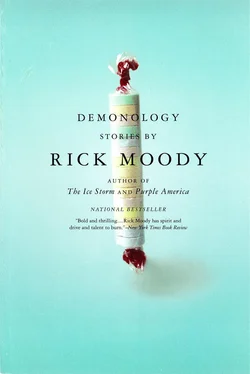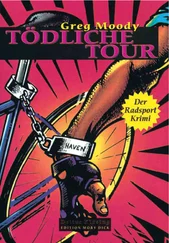Autumn, county fair of tonalities. People filed out of workplaces, out of tenements, onto stoops. Last time they could do so for months. Leaves clogged the street, the sewer lines. Where had these leaves come from? They were three blocks from the nearest tree. Northeast storms had blown through earlier, as storms did this time of year, and the limbs of the trees, those that remained in the Mile-Square City, were picked clean; each new gust brought a dusting of yellow symbols of decay. Clearly, it wasn’t only M. J. who made a poetics, a worldview, out of a drop in the temperature and a diminishment of light. Itremble like an aspen leaf, Nijinsky said. Her parents’ house had beautiful autumns. When the weather was fine, she practiced out on the lawn, while the man next door clipped graying blooms from his once bright hydrangeas. She bobbed above the clean lines of a box hedge, perfecting leaps, faint with hunger. She was always hungry. She was always cold.
The tawny huckster with the scheme to break and enter, Norbert, accepted her offer of a Major Video, Inc. lifetime membership card and began working on the lock, which seemed to involve scoring the paint job on the door frame with the edge of the plastic lamination. Gerry Abramowitz had his own Major Video card. This one could be sacrificed. From desperate sprees of video rental Gerry returned, in his usual nervous way, uncertain, taciturn, with a home festival of science fiction films and teen sex comedies. Talk to me a little bit, she asked. He’d laughed. He stayed up watching films after she’d gone to sleep and left early with his stack of bibliographical index cards. Her locksmith pro tern tried buzzing the tenants on the first floor. He bent the video membership card until it had a veiny fracture in it. M. J. was almost certain, in the light of streetlamps, that guests for the party had now begun to assemble. There was a couple in bowling shoes and Hawaiian shirts, his and hers, hair slicked with the grease of the period, Tenax or Vaseline; there was a guy with heavy tortoiseshell frames and a secondhand madras jacket. All bantering. M. J. would not meet these, her guests, on the front step, locked out, having given away Diet Coke and orange soda. It was humiliating.
— The Carnival Tradition, from Bakhtin, said the madras jacket.
— I thought it was Bakunin, said the woman.
— That’s anarchism.
— I know what anarchism is. You’ve got your B’s confused.
— We could go to the Middle Eastern place, you know.
— Uh, no civilization endures without temporary suspension of the rules of civilization.
— Let’s wait a few more minutes.
— Got a cigarette?
Whereupon the door to the building next to M. J.’s opened, being 619 Madison, known drug location, according to law enforcement circles, known for its potent smok-able form of cocaine. They had never given her any trouble over there, in the known drug location. They were vital and spirited American entrepreneurs. The door, a flimsy old composite affair, into which had been installed cheap stained glass, from Sears, swung back, and out of it came the dream within this dream, a cherub, a teenaged boy from next door, a Hispanic young man, an Edgardo or Jose or Miguel, perhaps, a fraternizer with users of the potent smokable form of cocaine, but with a perfect Hispanic celestial quality that he, young Angel, would have until he was older, had put on a few pounds, become a working stiff, traded beauty for dignity; for now as perfect as a boy in Hoboken could possibly be in pressed jeans, black work shoes, James Dean windbreaker, expertly tousled black hair, having strode out of a jailbreak movie, carrying somebody’s turntable, she couldn’t help thinking that he was stealing the turntable, and when he saw the crowd outside the front door, he turned, as if to rethink the plan, to secret himself indoors, away from the authorities. Did anyone still buy LPs? Even that store down by the PATH terminal where the gruff stoner with sideburns and ponytail wordlessly dispensed obscure rock and roll on vinyl — Syd Barrett, Lothar and the Hand People, the Nazz — even that store was on its way out; so why would Angel, the Hispanic cherub, steal a turntable?
She started down the steps toward him.
— I’m locked out here. Next door. And I got all these people coming over to see our new gallery here, and I’m wondering if you might know someone in the building here, or maybe —
A premeditated recognition on the part of Edgardo or Miguel.
— I gotta take this over to my friend’s.
— Oh, come on.
The turntable, balanced precariously on wrought-iron railing.
— Can I get over on the roof? M. J. said.
The rashness of the proposal, maybe, persuaded him to change his mind. What white girl from the suburbs would propose going over the roof? A conspiratorial grin broke out on his unblemished face.
— Sure, the roof. You could go over on the roof.
She asked if he would show her how, notwithstanding political implications of wanting to be shown how, wherein a woman asked a man for instruction, affected an unknowing because of the stylized exchange of information that might follow; she still liked it when a guy would show her how, whether it was how to program certain technological appliances, the coffee machine, the stereo, how to operate a handsaw or how to hit a backhand, and perhaps it would have been that way with Gerry, if he had known how to do anything, but he didn’t know much, a few knots from when he had taken sailing lessons in the suburbs, but he could fix nothing, and once a couple of weeks ago she had found him, inexplicably dangling a hasp in front of the windowsill, as if one could be used on the other, What are you doing with that hasp? He knew about Frege, Austin, Kuhn, but his evasions on home repair subjects were appalling. Can’t we get someone in to fix that? She inflated this evidence, on the front step of her building, into a notational system of romance: you and your lover showed one another how to, according to diagrams, and then when you knew how to, you moved on to the next person, to have them show you how. Once an object in question was fixed, you needed it broken again, or replaced by another, and fast. And the question before her now, by way of reminder, was how does a girl steal onto the roof of her building?
— Gonna put this back in the basement, Angel said. — Hang on.
Then he returned. Together they occupied the warped stairwell. Cinder block. Exposed ceiling bulbs dangling from frayed electrical lines. Lead-based paints flaking from scuffed walls. She followed him. With each flight of stairs, their pace increased, their gasps and exhalations, their anticipations, and she not only managed to keep up, but to drive Angel on more furiously, though she’d eaten nothing but a rice cake since throwing up breakfast. At last, they each grabbed the banister on the red emergency ladder; they hoisted themselves up; at last, they pushed back an old rotting hatch; at last, they heard a scattering of pigeons. They were on the roof.
Night had fallen across the landscape. Dramatically. Beyond the nub of green that was Stevens Institute of Technology at a distance, night upon the World Trade Center, night upon Hoboken high-rises, night upon the spectacle of New York City, night upon the Hudson, night upon the ships of the Hudson, night upon the garbage barges and their peppering of diapers and six-pack holders, night upon the history and politics of the tri-state area, night upon the Newport Mall of Jersey City, night upon Liberty State Park, night upon Edgewater, night upon Fort Lee, night upon the George Washington Bridge, night upon arteries great and small, night upon marshes and blacktops and rail yards and baseball fields and electrical substations. Who could turn from it? Who could neglect it? Night had come, even while the town below undulated with dispute and jubilance.
Читать дальше












